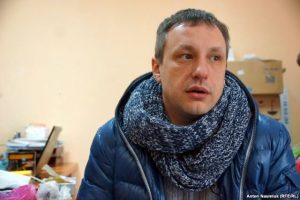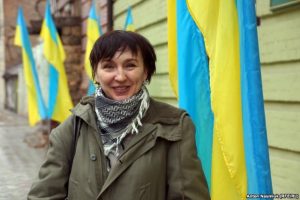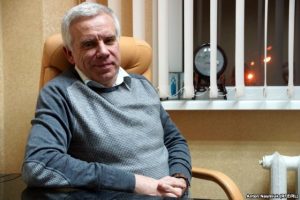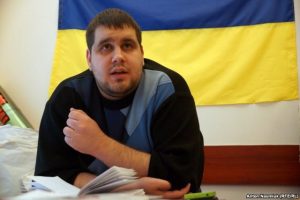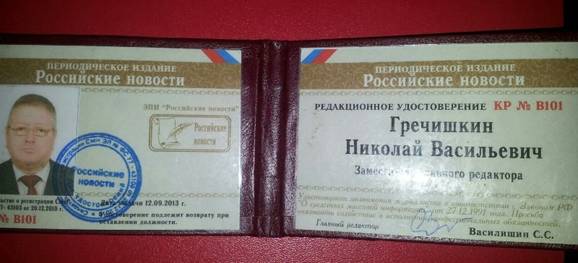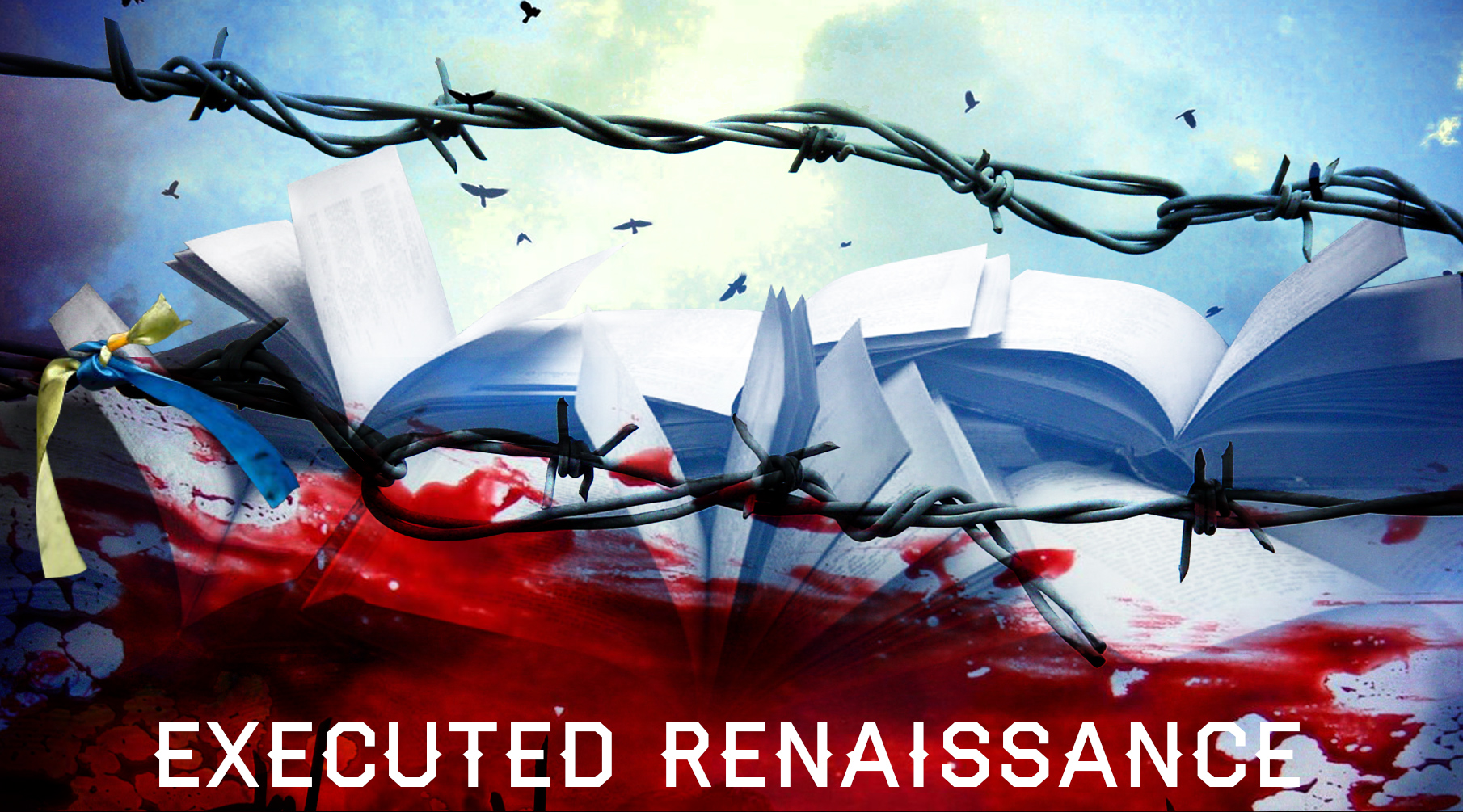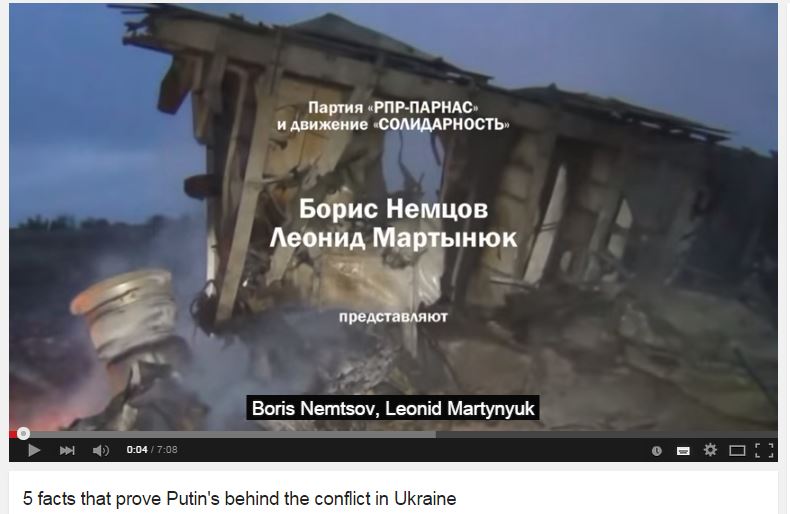The eastern part of Mariupol was hit by Grad rocket fire on January 24. A month has gone by but most of the windows in the high-rise buildings of the residential area of the Skhidnyi district, which came under fire, are still wrapped in a cellophane film that sways in the wind. In the parking lot and in the courtyards are burned out frames of vehicles, and buildings panels have huge holes that are reinforced only with steel plates in an attempt to stop further destruction.
The cellophane film was brought by volunteers who were on the scene within thirty minutes of the shelling. The district was divided into four parts, each the responsibility either of the city government or of the administration of the two largest steel companies -- Azovstal and Illich Iron and Steel Works. To judge by the accounts given by residents, the authorities took care primarily of evacuations in the central part of the city. Volunteers assumed responsibility for the delivery of food and water, the removal of rubble, and even certain questions relating to the funerals of the dead. The first bombing occurred Saturday morning around 10:00. The largest number of victims were at the nearby Kyiv market, which was filled with people at the time. Two more bombings occurred at noon and in the evening. Casualties numbered 31 killed and 117 wounded.
"They were shooting from here and there," an elderly woman points to the east and southeast directions away from the city. "Nobody is even mentioning how many people were killed. But they did put up a monument to the Heaven's Hundred (reference to the protesters killed at the Euromaidan in Kyiv last year -- Ed.), and everything. Did we beat this Heaven's Hundred or what? All this came from Kyiv. Somebody shot at them, but no one remembered us."
Residents of Skhidne talk reluctantly, do not want to mention names, but express irritation at the local authorities and fear of a recurrence of the January events.
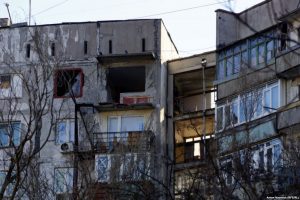 "Two shells fell here ," an elderly resident, who worked as a carpenter most of his life at the Azovstal Iron Works, points at the destroyed entrance to the high-rise. "One in the kindergarten, another at a pump. The windows were all blown out. The bombardment lasted 15-20 seconds. Based on all the calculations, they were firing from four Grad rocket launchers, but one hit Talakivka (large village near Skhidne -- Ed.) -- there at 8:00, and here at 9:20, from three sides. I opened the window and lay down in the hallway. My neighbor survived miraculously. He went to pay for his internet service, and a Grad rocket landed in front of him. He hid behind a wall. He ran home, and it hit again. A neighbor went to get milk. The Grad rocket hit the courtyard and she was thrown. She got up and ran to the basement, hiding under the stairs. And another Grad hit the entrance here. It's a good thing that the iron doors were closed. Otherwise everything would have been destroyed," he says.
"Two shells fell here ," an elderly resident, who worked as a carpenter most of his life at the Azovstal Iron Works, points at the destroyed entrance to the high-rise. "One in the kindergarten, another at a pump. The windows were all blown out. The bombardment lasted 15-20 seconds. Based on all the calculations, they were firing from four Grad rocket launchers, but one hit Talakivka (large village near Skhidne -- Ed.) -- there at 8:00, and here at 9:20, from three sides. I opened the window and lay down in the hallway. My neighbor survived miraculously. He went to pay for his internet service, and a Grad rocket landed in front of him. He hid behind a wall. He ran home, and it hit again. A neighbor went to get milk. The Grad rocket hit the courtyard and she was thrown. She got up and ran to the basement, hiding under the stairs. And another Grad hit the entrance here. It's a good thing that the iron doors were closed. Otherwise everything would have been destroyed," he says.
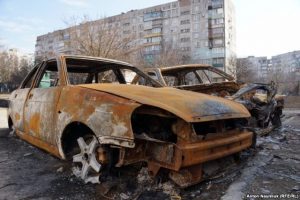 The Ukrainian side and the (Russian and "separatist") militants have accused each other of the shelling of Mariupol and other cities and towns of the Donetsk and Luhansk oblasts. After inspecting the area of fire, the special OSCE mission has concluded that the Grad rocket launchers were located on territory controlled by the "DNR" ("Donetsk People's Republic") groups.
The Ukrainian side and the (Russian and "separatist") militants have accused each other of the shelling of Mariupol and other cities and towns of the Donetsk and Luhansk oblasts. After inspecting the area of fire, the special OSCE mission has concluded that the Grad rocket launchers were located on territory controlled by the "DNR" ("Donetsk People's Republic") groups.
Skhidne residents who observed and experienced the shelling generally agree. "We think it's 'DNR,' says a former factory worker who lives in Skhidne. "They were using heavy artillery fire in the direction of the ranges (occupied by separatists). And on Saturday (Russian and "separatist" forces) answered with Grad rockets. As always, one side provokes the other and the other side responds. However to hit the residential areas could not have been a mistake. Right now even if someone knew the truth they would never reveal it. Because if you tell the truth you'll be gone tomorrow. They could not have been firing from Staryi Krym (village near Mariupol occupied by the Ukrainian army -- Ed.); that's obvious to a fool," he concludes.
Two sides of Mariupol
In the spring of 2014, the city was controlled by the so-called "separatists" for a while when the city council building was seized by people with Russian flags and "Donetsk People's Republic" banners. On April 16, a crowd went to storm the barracks of the National Guard, used a car to ram the gates, and threw Molotov cocktails on police officers who tried to fire back. Eleven people died. In May an armed confrontation between the Ukrainian army and "separatist" forces led to the deaths of several dozen people. As before, the city is now divided in two: those who support the "separatists" and who are favorably inclined to Russian domination and those who consider themselves Ukrainian patriots and who support Kyiv's efforts to fight "DNR" and "LNR."
Many pro-Russian residents believe that the January shelling was a provocation by the Ukrainian side . "This was a provocation. The entire city knows it, a Mariupol taxi driver says with conviction. "During the night they took out the rockets and filled in the craters in the pavement. Then others dug to cover the tracks."
Local taxi drivers almost all support the "separatists." The police, who have been guarding the Mariupol bridges since the terrorist act in December 2014, when the iron bridge over the Kalchyk river was blown up, do not trust the taxi drivers. Some time ago they were forbidden to use video systems for fear that videos of roadblocks where taxis can go easily would be used to draw enemy fire. Among the taxi drivers are many arrivals from the towns captured by "DNR." There is no work for them there, but their families have been left behind along with hopes for a better life that they associate with Russia.
"When Russian troops come here they will build a six-lane highway and all the goods will go through Mariupol to Crimea, Mykola, a young man who arrived from separatist occupied Horlivka, explains eagerly. "Then we will begin to live normally. I have relatives in Rostov and I can't visit them. What nonsense." Mykola also works as a taxi driver. Earlier, he would have gone to Donetsk to get a passenger transport license. Now those documents can be obtained only in Kyiv. Obviously this is one of the key reasons for separatist attitudes among the Mariupol taxi drivers. Many of them are newcomers with relatives in the occupied territories, low wages and no prospects.
"The real threat is not internal," says Petro Andriushchenko, coordinator of the volunteer organization "My razom" (We're together), referring to the sentiments among the population. "It is no longer that easy to stir up the elderly and the entire marginal pro-Russian segment. Of course, people have illusions, but it is important to understand that Mariupol society consists of 20% pro-Ukrainian people and about the same number of those with pro-separatist sentiments. The rest are "sheep," empty-headed and just on the lookout for money.
The progressive youth of the city has always wanted to get away. The only ones left were generally those who went to work in the factories. During Soviet times, Mariupol was among the top cities for juvenile delinquency. Criminal activity has increased now. But as long as (criminals) fear strength, they will whisper in corners, huddle in groups but will not become active," Andriushchenko says.
According to Andriushchenko, all methods of influencing the pro-Russian segment of the population have been exhausted. The pro-Ukrainian activists, who in the spring only watched the seizure of municipal buildings, have now been radicalized and are ready to resist. Many of them participated in building fortifications for the city, with entire families going to the checkpoints. "Right now there's a majority of pro-Ukrainian activists, he says. The pro-Russian people have partly left and partly taken cover. Therefore there are more of our active (pro-Ukrainian) people. At least they are more visible," he says.
The large charred city council building remains unchanged in the center of the city, with boarded up windows and doors. It is impossible to enter, and restoration has yet begun. A few elderly people are constantly present in the square in front. Local residents say these are pro-Russian Communists.
The new elite
In February 2014, when the confrontation between pro-Ukrainian and pro-Russian forces had not yet become a military one, the mayor of Mariupol, Ihor Khotlubei, felt bold enough to attach a St. George ribbon to his lapel (symbol of pro-Russian separatists -- Ed.). A month later, when the prospect of a referendum on the status of Mariupoll became apparent, Khotlubei announced that he did not intend to take part in the next mayoral election. However he is still mayor. Pro-Ukrainian activists do not trust the city government and criticize its indecision and inaction. The only person whose authority is recognized is the new head of the oblast police, Major General Viacheslav Abroskin.
"Essentially, the issues we're dealing with have gone beyond strictly humanitarian aid; it is now politics," Andriushchenko says. "Countless volunteer organizations are doing what the government should be doing: evacuating people, collecting and distributing humanitarian aid, taking care of film for broken windows, and supplying uniforms for the military." This type of situation where community activists often are critical of the local authorities but actually replace the work of the administrations while continuing to declare the ideas of Euromaidan can actually be observed throughout eastern Ukraine.
One of the Euromaidan activists, Halyna Odnorih, describes how she evacuated people from the Hranitne and Shyrokyne villages that were under artillery fire. "Someone from the State Emergency Service calls and says: 'we were told that you're taking care of evacuation. Do you need any help?' I say we do. Here are the addresses, these people need to be evacuated. No, they say, 'we will provide psychologists, vehicles. But we will not go there for evacuations. After all, they're shooting there,'" As a result, more than 600 people were evacuated from Shyrokyno with the help of armored vehicles from the National Guard. Odnorih also ended up taking care of the funerals of several of the people who had been killed during the shelling of the Skhidnyi district in January.
Ukrainian flags are now visible on the streets of Mariupol. In a city where approximately equal numbers came out to demonstrate for Ukrainian unity as did for annexation by the DNR, such displays of loyalty to Ukraine have been restrained until recently. According to Odnorih, the flags were her initiative and were supported by the administration. "They bought several hundred flags, then they call me and ask: 'Halyna, where should be hang them?' Thus, they could not even decide by themselves on which streets they should hang the flags," she says with astonishment.
Failing to match the volunteers organizations, local administrations in eastern Ukraine often cautiously try to cooperate with them. In Kramatorsk, the oblast authorities proposed creating a Volunteer Council, and in Mariupol they included the Mariupol Defense activists to organize the defense of the city. The director of the group, Denys Havrylov, maintains that the local government, the ATO forces, and volunteers have done everything possible to defend the city in the event of a full-scale offensive by Russian and separatist forces. "There is no panic, Havrylov says. "The city is protected by three levels of defense, the warning system has been expanded, with 5-7 minutes of advance warning in case of attack. Havrylov says the administration and the Mariupol Defense have organized special training to practice responses during a possible attack, but so far few residents are participating.
Obviously, the young pro-Ukrainian activists will need political power sooner or later to be able continue volunteer work. Odnorih admits that she has been paying for most of the humanitarian aid herself and that her small business is practically exhausted.
"If this conflict lasts another year, I don't know what I'll do. I will simply be ruined," she says. In order to keep providing humanitarian assistance and to continue supplying the armed forces, the activists are now trying to enter the councils and executive bodies of municipal governments in eastern Ukraine. Havrylov, who is active and apparently acceptable to the authorities, has been trying to present his candidacy to the city council since February 27. So far unsuccessfully.
Who needs the city and why
According to Ukrainian authorities, the so-called "separatists" have openly violated the Minsk agreements in order to seize Debaltseve -- the railway hub connecting the Luhansk and Donetsk oblasts. Mariupol is considered of equal importance. "There is a port and an airport. If Mariupol is captured, then whatever ceasefire that follows -- the fourth to be announced -- will already mean preparation for a full-scale war," says Yaroslav Yerokhin, an activist with the "My Razom" organization, who escaped separatist-controlled Donetsk. Andriushchenko, who agrees with him, points out that if "DNR" intends to create a land corridor from Russia to Crimea, then Mariupol is the only large city on the way. "If you look at the coastline, there is no other large city on the way to Crimea. Only Berdiansk and Melitopol are left," he notes.
The city's steel industry is one more reason why Mariupol may be important to Russian forces. "Mariupol is able to produce armor for tanks. Azovmash produced armored personnel carriers even earlier, which were later furnished with towers, machine guns and all the rest in Kharkiv. It was here that tank armor and submarine parts were produced. If Mariupol is taken, then you can stuff DNR with all kinds of equipment and say that all of it was assembled at the plant," Andriushchenko says. Mariupol is called "the key to Kyiv," since the seaport is a major source of currency for the Ukrainian government.
Despite the declared withdrawal from the frontline, the city is preparing for defense thoroughly. According to Denys Havrylov, under current conditions, the losses of Russian and separatist forces would number 8,000 to 12,000 personnel and 5,000-6,000 units of equipment. He does not think the enemy will be ready to accept such losses.
Havrylov, referring to the ATO headquarters in the M sector, denies a recent statement by the Ministry of Defense that DNR is concentrating forces near Mariupol. "The intelligence of the local ATO office does not confirm this," Havrylov says. "We have overcome the psychological barrier where we were incapable of shooting our neighbors. Now in the police force we have only those who are ready to carry out orders and to die. Earlier we could not shoot at people, now we are ready," he says.
Viacheslav Abroskin, the chief of the oblast police, gives the same assessment of the city's defense. Halyna Odnorih, as do most of the activists who regularly go to the front, believes the city will probably not have to suffer such an assault. "It is far more likely that separatist forces will circle the city, seize the surrounding villages, and go on, and Mariupol will be encircled," she says, adding that it is impossible to predict how the population, will behave, given the sizable pro-Russian segment.
"The defense will depend to a great extent on the morale of those who resist," says Mykhailo Pasichnyi, a surgeon and an activist who took part in pro-Ukrainian demonstrations in the spring. "There are people who don't care one way or another. They will be afraid and hide. There are pro-Russian people who will escape as well and who will not stand in the way of the separatists."
However Denis Havrilov believes there are enough people in Mariupol who are ready to support the armed forces of Ukraine during a "separatist" assault.
The residents who went to Kyiv to the Euromaidan and in the spring came out in the streets of Mariupol with Ukrainian flags in hand, those who witnessed the fighting of May 9, 2014, the people who experienced the Grad bombardment of the city in January are determined, he says. They compare Mariupol, which is under Ukrainian control, and Donetsk under Russian "separatist" control and they do not intend to surrender the city without a fight, as was the case last year. "We will go down in history," says Havrylov. Perhaps the names of specific persons won't be mentioned, but we will all go down in history."


